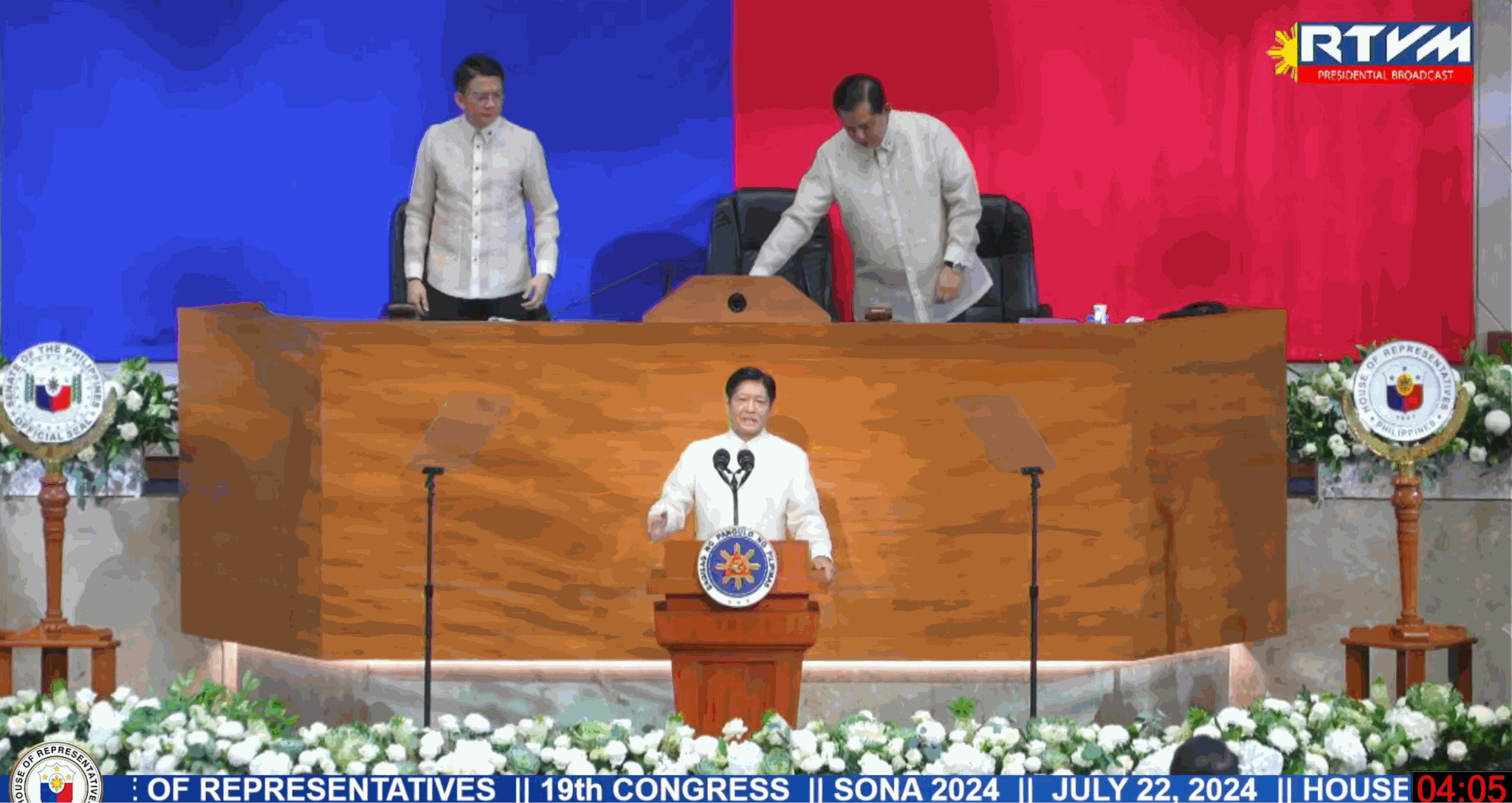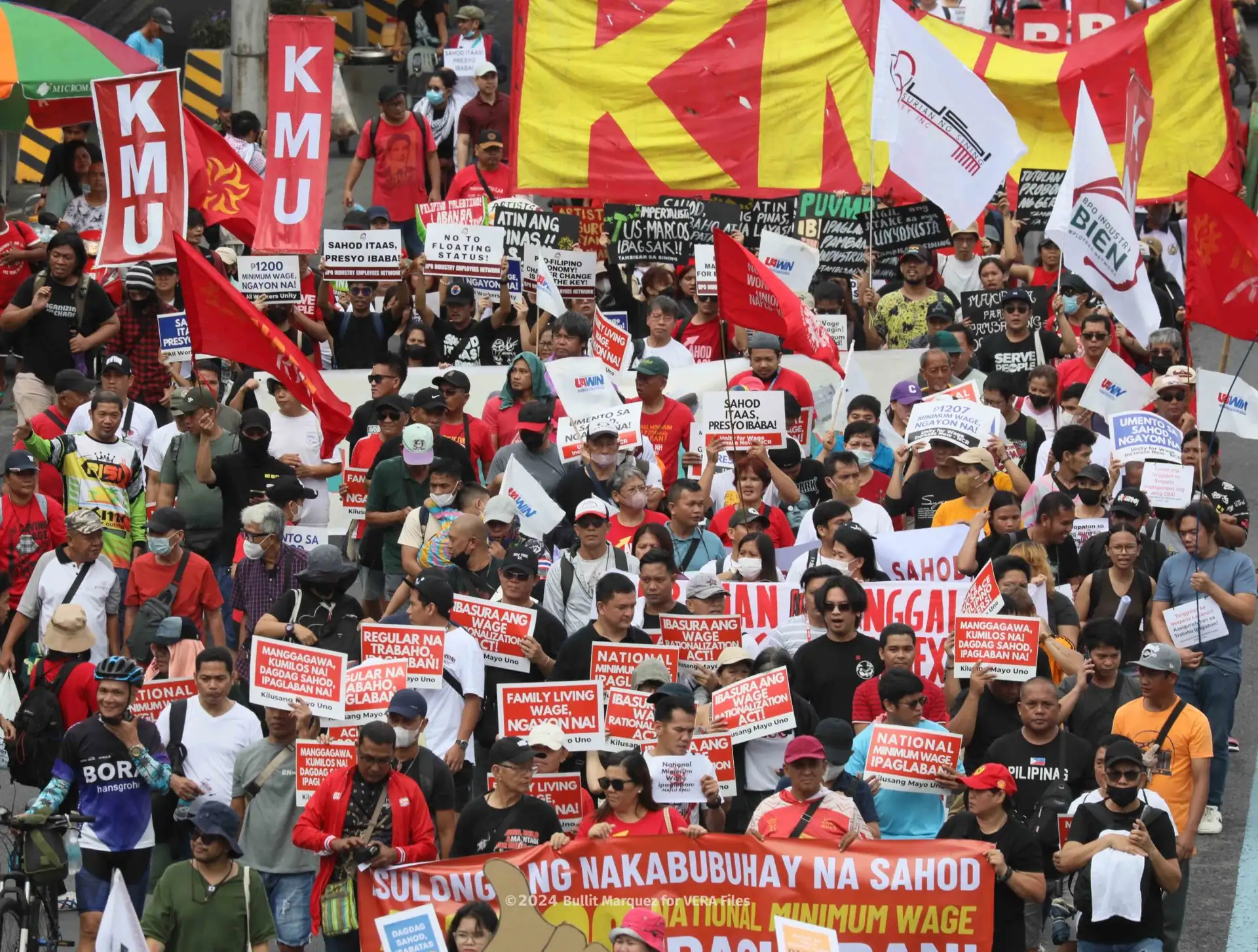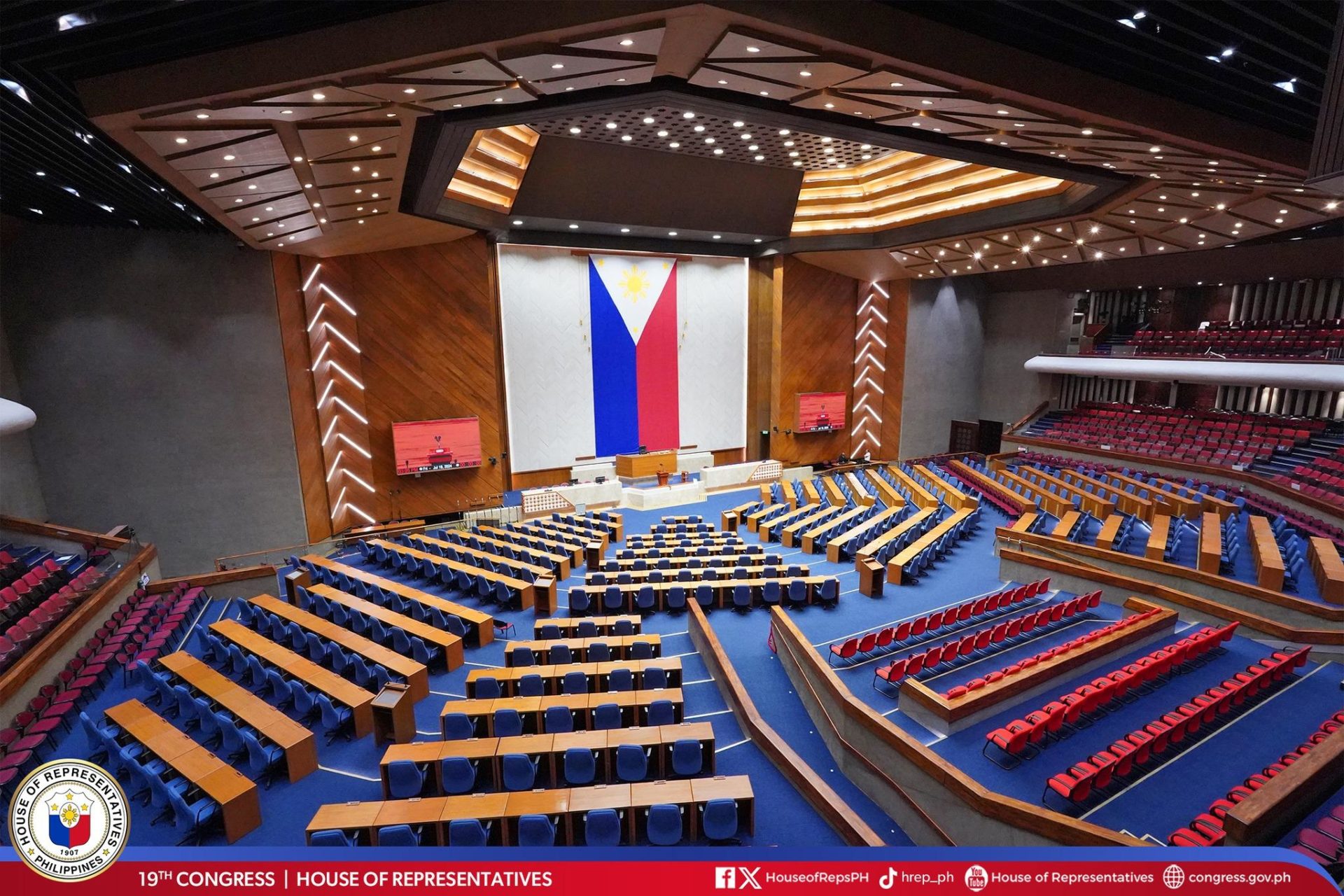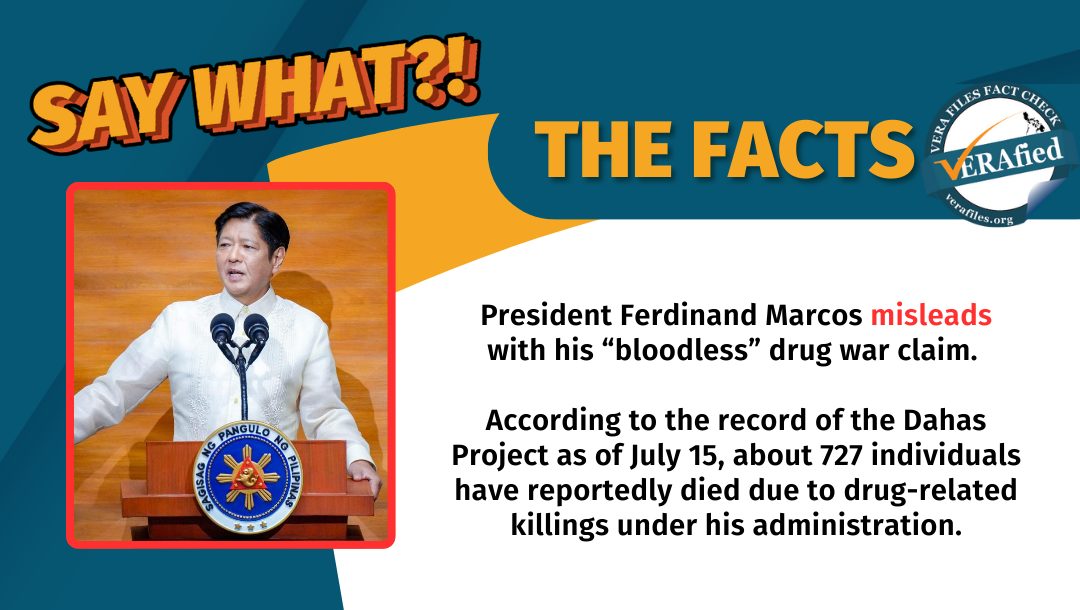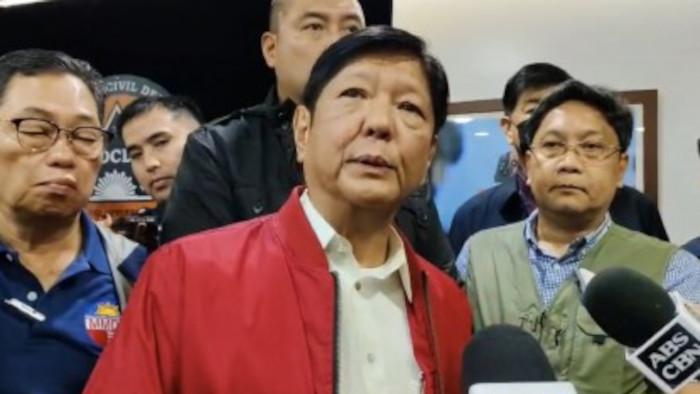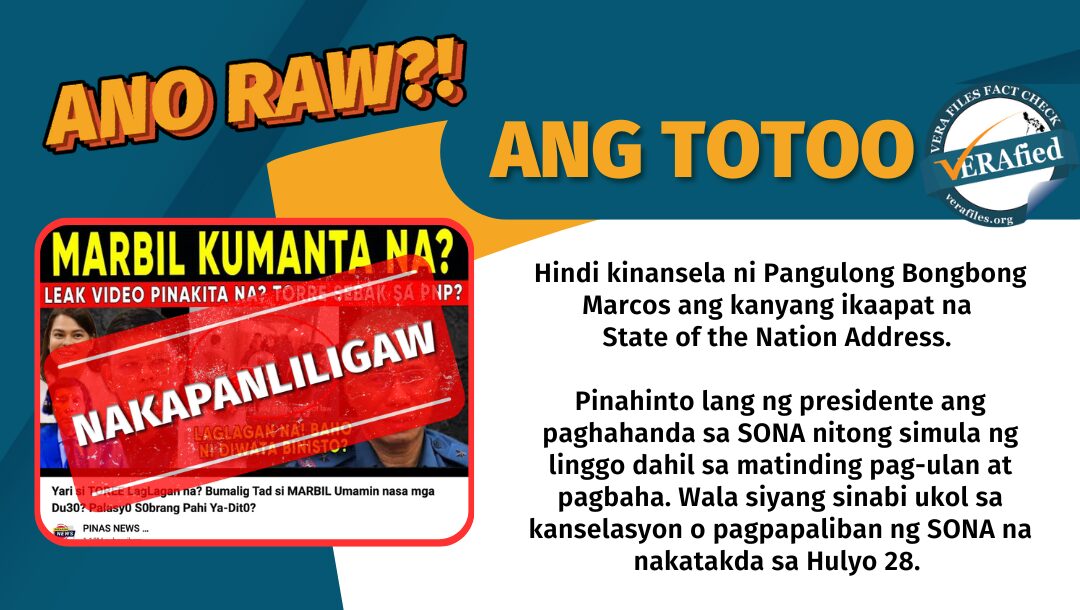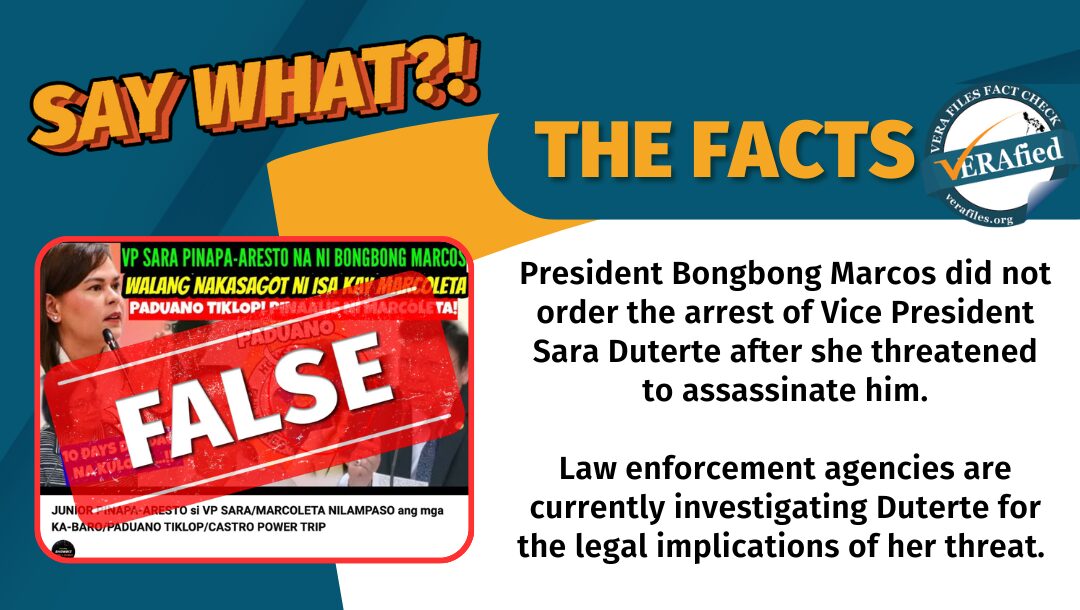Editor’s Note: This story was updated to correct two errors in the copy. An earlier version of the article stated that POGOs are Philippine offshore gaming operations. POGOs refer to Philippine offshore gaming operators. We have also corrected the information regarding the poverty incidence ranking of BARMM. An earlier version of the story stated it has the highest ranking in Mindanao instead of the whole country.
An immediate ban on Philippine offshore gaming operators or POGOs, underscoring of a bloodless fight against illegal drugs, and a reaffirmation of a commitment to defend territories in the West Philippine Sea are key pronouncements that earned President Ferdinand Marcos Jr. three standing ovations during his third State of the Nation Address (SONA) on Monday, July 22.
“Effective today, all POGOs are banned. I hereby instruct [the Philippine Amusement and Gaming Corporation] to wind down and cease the operations of POGOs by the end of the year,” said Marcos, eliciting a 31-second applause.
This is the first time Marcos mentioned POGOs in a SONA. It came amid mounting public outcry and scrutinization from Congress on online gambling operations being linked to criminal activities.
“Disguising as legitimate entities, their operations have ventured into illicit areas furthest from gaming, such as financial scamming, money laundering, prostitution, human trafficking, kidnapping, brutal torture, even murder,” the president added. “The grave abuse and disrespect to our system of laws must stop.”
Marcos’ third address on the country’s state of affairs was attended by over 2,000 people, sans Vice President Sara Duterte, who has made it known publicly that she was skipping this year’s event. Despite a Duterte-less SONA, Marcos enjoyed over 100 interruptions by applause during his 81-minute speech.
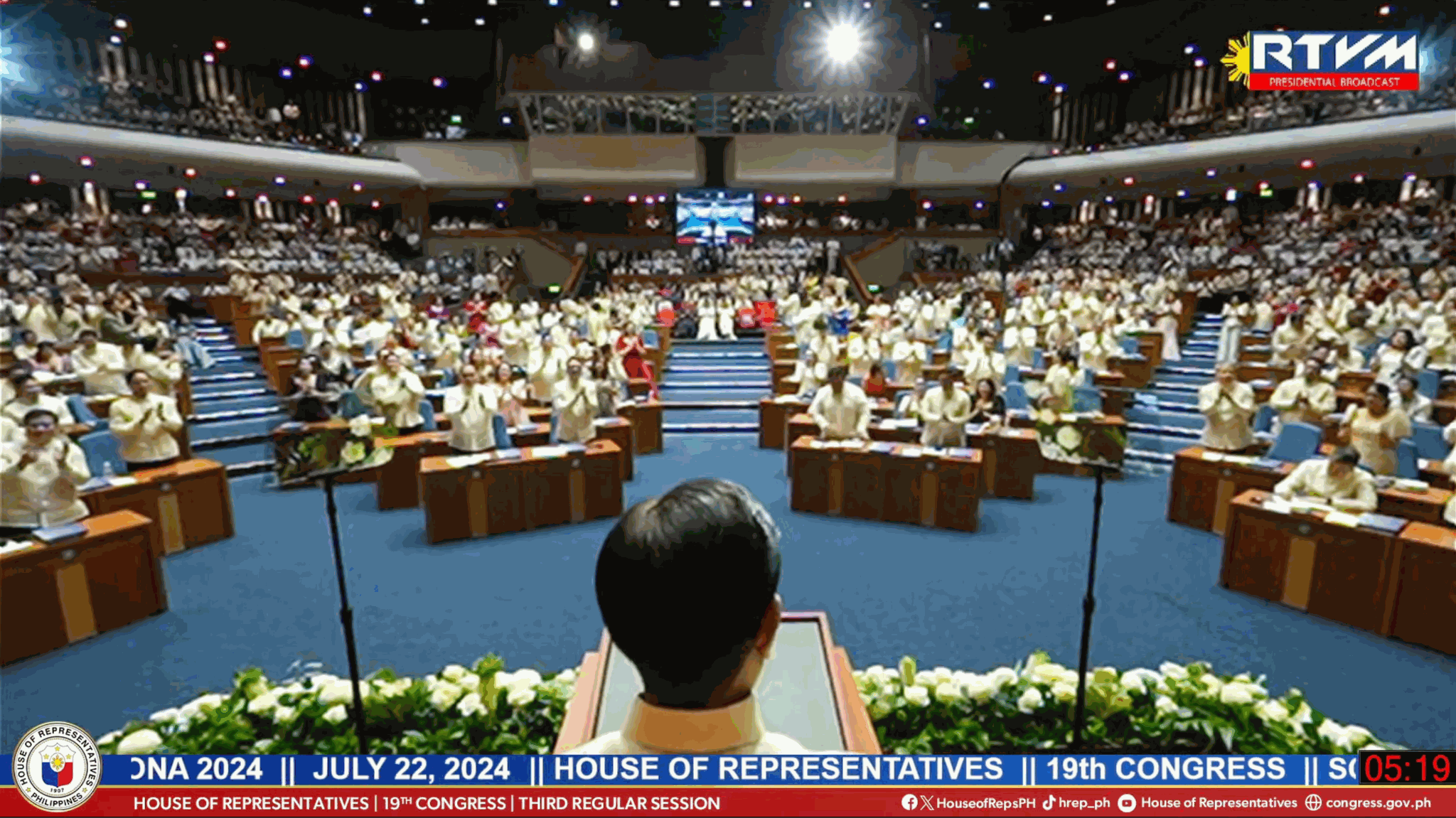
Taking a radically different stance from his predecessor and VP Sara’s father, Rodrigo Duterte, Marcos also stressed his administration’s “bloodless” approach to fighting the drug problem.
“Our bloodless war on dangerous drugs adheres and will continue to adhere to the established eight Es of an effective anti-illegal drug strategy. Extermination was never one of them,” he said, prompting another long applause from his audience of mostly legislators and other government officials and members of the diplomatic community.
Duterte’s drug war has left over 12,000 Filipinos dead, according to Human Rights Watch.
Near the end of his speech, Marcos maintained a commitment to de-escalate tensions in contested areas in the West Philippine Sea and became emotional as he thanked the Armed Forces, the Philippine Coast Guard and Filipino fisherfolk for their hard work and sacrifice to defend the nation.
“Ang West Philippine Sea ay hindi kathang-isip natin lamang. Ito ay atin (The West Philippine Sea is not a figment of our imagination. It is ours),” he said.
Marcos covered a lot of ground in his most recent SONA. For a recap of what he said about each sector, read more below:
On agriculture
Marcos opened his address to the joint session of Congress by acknowledging the soaring prices of basic necessities, particularly rice, as Filipinos continue to remind him of his campaign promise to bring down its price to P20 per kilo.
“The hard lesson of this last year has made it very clear that whatever current data, proudly bannering our country among the best performing in Asia, means nothing to a Filipino who is confronted by the price of rice at P45 – 60 per kilo,” he said.
Making sure that his message is well understood, he said in Filipino: “Bagamat maganda ang mga istatistikang ito, wala itong kabuluhan sa ating kababayan na hinaharap ang realidad na mataas ang presyo ng mga bilihin, lalo na ng pagkain — lalo’t higit, ng bigas.”
Noting that while the country’s palay harvest was at the highest level since 1987 at more than 20 million metric tons, which is equivalent to 13 million metric tons of rice, the government still has to import to meet the demand of 16 million metric tons.
However, he assured that his administration will prioritize boosting local production by supporting Filipino farmers and fishermen. He cited the condonation of farmers’ debts and resolving agrarian reform cases among the efforts to help the agriculture sector. He said he aims to build more farm-to-market roads, machines, Kadiwa centers, and irrigation facilities by the end of the year.
The president vowed to implement pre-border technical verification and cross border electronic invoicing of imported commodities. This, according to Marcos, serves as a warning against smugglers that his administration “means serious business.”
On energy
Seeking to add reliable power supplies to the country’s energy mix, Marcos lauded the completion of the Cebu-Negros-Panay Backbone Project, which aims to solve power outages in the Visayas islands. He also cited the completion of the Mindanao-Visayas Interconnection Project (MVIP) and called the P52-billion project a “defining moment” in the country’s energy history. The MVIP connects the major power grids of Luzon, Visayas and Mindanao for a more stable power transmission service.
“Finally, we have connected the power grids of all three major island groups,” he said.
While Marcos failed to mention several bills stalled in Congress that could further boost the country’s energy supply, he nonetheless urged lawmakers to amend the Electric Power Industry Reform Act to bring down electricity prices and ease the burden on millions of Filipino consumers.
On the environment
Despite the country’s high vulnerability to the effects of climate change, there is still an absence of a concrete plan from the president to heighten climate responsibility and justice, for the third year in a row.
Instead, Marcos focused on the Philippines’ role as host to the Board of the Fund for Responding to Loss and Damage earlier this year. The fund aims to help developing countries mitigate the effects of climate change and aid such countries to recover from natural disasters.
In line with this, the president mentioned efforts that aim to beef up the country’s disaster risk reduction, monitoring, mitigation and response through the establishment of the Disaster Response Command Center of the Department of Social Welfare and Development. Marcos also flaunted the ongoing rehabilitation of the Pasig River, backed by Executive Order No. 35 that Marcos signed a year prior to his third SONA.
On the economy
Marcos boasted about the country’s economic gains, highlighting the drop in poverty rate recorded at 15.5% in 2023, compared to 18.1% in 2021, and 16.7% in 2018.
To further boost economic growth, he mentioned policies and programs such as reforms in the capital markets and implementation of green lanes, the rationalized incentive scheme under the Corporate Recovery and Tax Incentives for Enterprises (CREATE) Act which generated more than P1 trillion of investments; the digitalization and streamlining of doing business and delivering government services; the Paleng-QR program, which promotes cashless payments in public markets and community shops; and the Anti-Financial Accounts Scamming Act and the New Government Procurement Act both enacted last Saturday. Marcos also hoped for the passage of the CREATE More Act, which is still pending with the House.
Notably, there was no mention of the Maharlika Investment Fund and the proposed amendments to the “economic” provisions of the 1987 Constitution.
On health
Marcos paraded the formation of new medical specialty centers and community health facilities across the country. This includes the Philippine Cancer Center, which broke ground in Quezon City last March, as well as 20 newly built Bagong Urgent Care and Ambulatory Service (BUCAS) centers, which will cater to poor patients whose conditions do not require hospital admission.
“Layunin natin na sa lalong madaling panahon, lahat ng lalawigan natin ay may sapat nang mga center o pasilidad na may kakayahang makapagbigay ng pangunahing serbisyo medikal para sa ating mga mamamayan (Our most immediate goal is for all provinces to have enough centers or facilities that can provide primary medical services to our citizens),” Marcos added.
He likewise cited PhilHealth’s expansion of its benefit packages for acute stroke and pneumonia patients to P76,000 and P80,000, respectively. The number of generic medicines covered by the state health insurance has been increased from 21 to 53, including medications for hypertension, nerve pain and epileptic seizures.
Insurance coverage for breast and colon cancer patients increased this year, while benefit packages for patients undergoing chemotherapy for lung, liver, ovary and prostate cancer will be launched before the year ends.
On infrastructure
Marcos claimed that the infrastructure developments are sustained, strategic, and on schedule as of his midterm. He highlighted the institutionalization of Public-Private Partnerships as key to the timely completion of projects under his Build Better More program.
The president touted his administration’s efforts to improve the country’s internet infrastructure: from operating 13,000 Free WiFi sites that cater to 10 million unique users, accomplishing Phase 1 of the National Fiber Backbone (NFB), to completing the NFB’s Phases 2 and 3 by 2026. A national cybersecurity plan to curb cybersecurity attacks was also mentioned.
On transportation
Marcos flaunted the significant improvements on road and bridge infrastructures that will connect more areas in the country.
As of May this year, 12,000 kilometers of roads and 1,200 bridges have been constructed or upgraded nationwide. Meanwhile, more than 70 airports and seaport development projects have been completed, and 350 more are slated for completion by 2028.
Calling it a “railway renaissance,” Marcos highlighted the on-going Metro-Rail Transit 7 and North-South Commuter Railway projects, the expansion of the LRT 1, and the reopening of the PNR Bicol line, among others. The president said the Ninoy Aquino International Airport will soon undergo revitalization to achieve a “world-class” status.
On basic services
Marcos vowed to improve government incentives for vulnerable sectors such as the elderly and persons with disabilities. PhilHealth will launch benefit packages for children with disabilities in 2025 while discounts on basic necessities have almost doubled for senior citizens and persons with disabilities.
“Natuwa kayong lahat doon ‘no (That made all of you happy, didn’t it),” Marcos quipped before his audience who applauded the announcement.
The government’s hunger alleviation program called Walang Gutom 2027 will be fully rolled out this year to feed 300,000 low-income households and is envisioned to cover all one million food poor households in three years. In the 2025 budget, a new grant will be included in the Pantawid Pamilyang Pilipino Program (4Ps) to expand health benefits for pregnant women and children below 2 years old.
On foreign relations
Receiving a standing ovation with loud applause and cheers from the audience, Marcos once again asserted the Philippines’ sovereign rights over the West Philippine Sea (WPS), declaring that it “cannot yield” and “cannot waver” to China’s continued claim of almost the entirety of the South China Sea.
He emphasized that the WPS is not a product of the Filipinos’ imagination and vowed to strengthen the country’s defense posture by developing self-reliance, forging foreign partnerships and settling disputes through proper diplomatic channels and mechanisms.
“Ang West Philippine Sea ay hindi isang kathang-isip lamang. Ito ay atin. At ito ay mananatiling atin hangga’t nag-aalab ang diwa ng ating mahal na bansang Pilipinas,” he said.
“We continuously try to find ways to de-escalate tensions in contested areas with our counterparts without compromising our position and our principles,” the president added.
Meanwhile, Marcos boasted that partnerships he had formed with “like-minded states” during his foreign trips in the past two years have resulted in investments, strengthened national security and quality jobs for Filipinos seeking employment abroad.
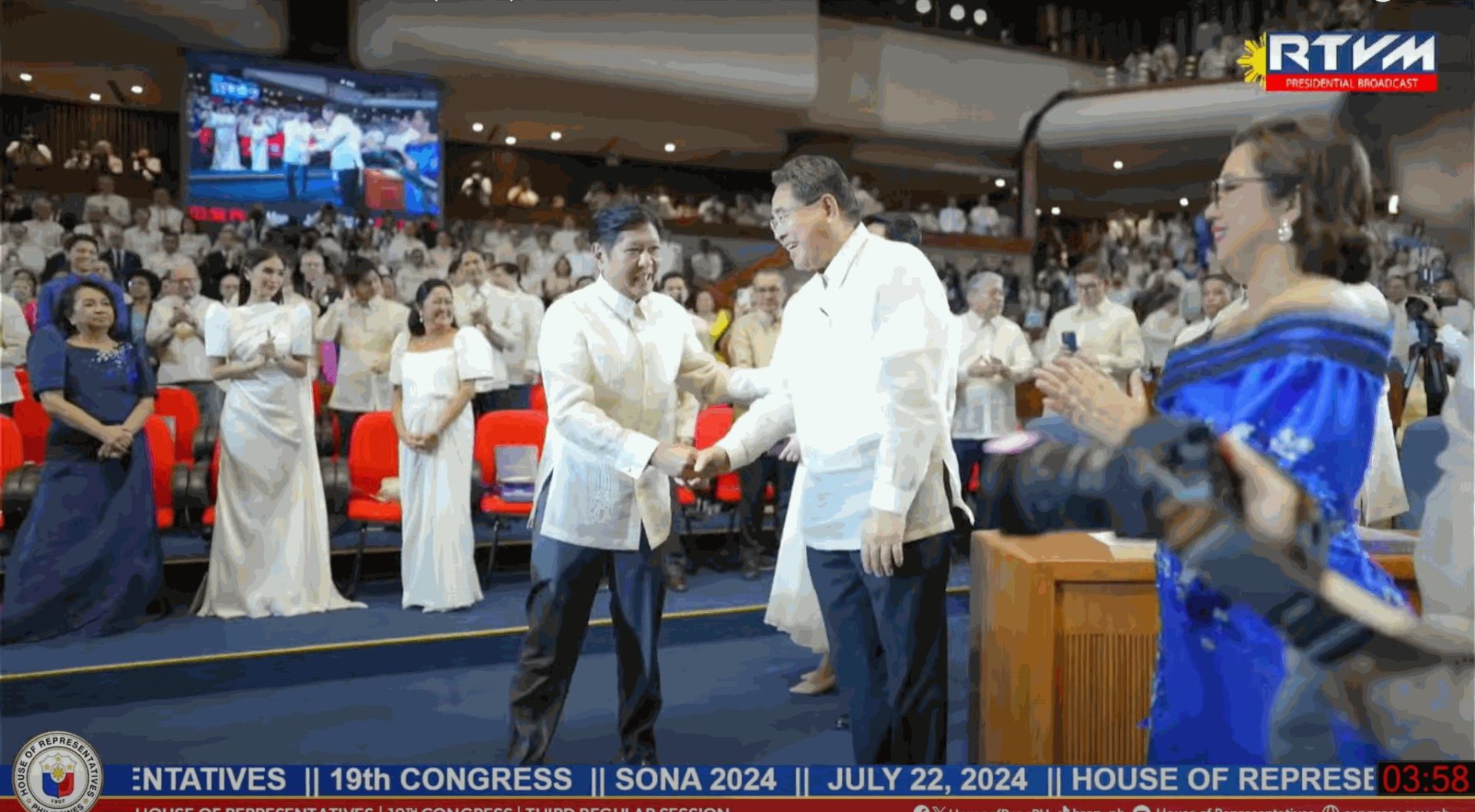
On education
In response to the “poor reality” of Filipino students lagging behind the world in various subjects, Marcos said he would address this gap through technological reforms by equipping students with essential resources and access to the internet. He challenged the newly-appointed Education Secretary Sonny Angara to fast track such projects.
The president acknowledged the teachers as the foundation of the country’s educational systems, and cited that 5,000 administrative positions have since been opened under Vice President Sara Duterte during her stint as Education secretary, to help them with administrative work.
Marcos promised an Expanded Career Progression System and vowed that the Kabalikat sa Pagtuturo Act, which provides for yearly allowances for public school teachers, will take effect next year.
Additionally, Marcos mentioned “Filipinovation,” Malikhain Programs and the development of artificial intelligence systems in Technical-Vocational Education and Training centers nationwide as innovative efforts under the education sector.
On labor, OFWs
As expected, Marcos highlighted the country’s latest employment rate of 95.9% as a major achievement of his administration in the labor sector. This marks a 0.2% increase from last year’s 95.7%, resulting in 610,000 more Filipinos employed as of May, compared to the previous year. He underscored the improvement in the quality of jobs generated for Filipinos, with the underemployment rate dropping from 11.7% last year to 9.9% this year.
While the president briefly mentioned the minimum wage increases across different sectors nationwide, no commitment or proposal was put forth regarding further wage hikes for non-government workers even while this issue ranks second among the most urgent national concerns for Filipino adults, based on Pulse Asia Research’s June 2024 Ulat Ng Bayan survey.
But for government employees, Marcos promised a salary raise in four tranches starting this year and an additional medical allowance beginning next year. He said this would put the government’s salary rates at a competitive level with the private sector “to attract, retain and engage employees needed by different agencies in the delivery of public services.”
Marcos recognized the vital contribution of overseas Filipino workers (OFWs) to the country’s recovering economy after the sector sent $37 billion in remittances last year, as reported by the Bangko Sentral ng Pilipinas. “Kaya hindi lamang pasasalamat kundi parangal ang ating ipinapaabot sa lahat ng ating mga OFW (So we extend not only gratitude but honor to all our OFWs),” Marcos remarked. He reaffirmed his administration’s efforts to ensure the welfare of OFWs, including its partnerships with other nations to secure quality overseas employment opportunities, as well as initiatives to safely repatriate OFWs affected by conflict, calamities and crises.
On good governance
Marcos recently enacted the Anti-Financial Account Scamming Act to heighten the security of banks and financial institutions, and penalize social engineering schemes and money mules.
Aside from his direct order to ban POGOs effective immediately, Marcos has not offered any concrete steps to address the issue of corruption in the government.
On the Armed Forces
Amid continuing Chinese aggression on the West Philippine Sea, Marcos said his administration has been improving “aerial and maritime domain awareness” while continuing to boost the country’s national defenses by developing a more self-reliant defense posture and creating partnerships with other states.
But during his speech, the president never touched on the much-needed reform of the current pension system of military and uniformed personnel (MUP), which he promised during his first SONA. For now, the government is fully funding the pension and receives no contribution from active MUPs.
Economic authorities have been warning of a looming financial collapse if the current system does not change. The House-approved bill on the pension system has been stalled at the Senate.
On the peace agenda
In the “quest for a lasting and inclusive peace,” Marcos flaunted the implementation of his proclamations granting amnesty to rebel returnees – which caused a notable disagreement between him and Vice President Sara Duterte in 2023.
He then stressed the readiness of the Bangsamoro Autonomous Region of Muslim Mindanao (BARMM) to hold its first-ever parliamentary elections in May 2025, noting the creation of new laws, codes and intergovernmental mechanisms by the Bangsamoro Transition Authority.
Even though Marcos highlighted that poverty incidence in BARMM “has significantly decreased” since 2018, the Philippine Statistics Authority and the National Anti-Poverty Commission reported that the region still has the highest poverty incidence in the country.
On drugs and crime
“Extermination was never part of them,” Marcos said about the new and “effective” drug strategy of his administration’s touted “bloodless” drug campaign, in sharp contrast to the bloody drug war of his predecessor.
Marcos said his administration has since conducted more than 71,500 anti-drug stings that resulted in the confiscation of illegal drugs worth over P44 billion and the arrest of 97,000 drug personalities, of which 6,000 were high-value targets, 440 were government employees, 42 were uniformed personnel and 77 were elected officials.
But contrary to the latest count of the Dahas Project, an initiative of the University of the Philippines’ Third World Studies Center, about 727 individuals were reportedly slain due to drug-related killings under his government as of July 15. In a recent report, it noted that drug-related deaths during the second year of the Marcos administration had surpassed the total number of deaths in its first year.
(Read Year 2 of Marcos’ drug war: More killings than in Year 1)
On the media
Marcos was mum on matters pertaining to the media.
–with reports from Nica Rhiana Hanopol, Blanch Marie Ancla, Rhoanne De Guzman, Merinette Retona, Enrico Berdos, Bryan Manalang, Valerie Joyce Nuval, Rhenzel Raymond Caling, Vincent Galaura, Jonathan Ray Merez, Janna Grace Millenas and Nikki Shane Pillejera
